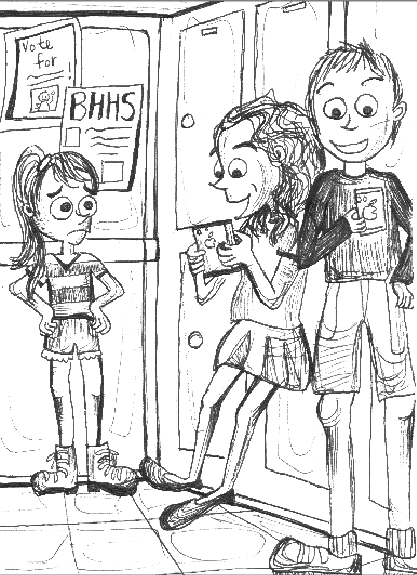As seen in the May 23 print edition
Danny Licht, editor-in-chief
 At a music festival last summer, a few girls pushed their way in front of me, and that was fine — it was a music festival — but when they did, they also disregarded the music. They continued their conversation. They drowned out one of Yo La Tengo’s quiet (and beautiful and wonderful) songs with their talk of leaving. Of food trucks. Of what band plays next and where. All three were on their phones and texting and talking to each other about better places to go. One of them took a moment away from her iPhone to check out the band onstage, the band that most of us were there to see, and she turned back to her friends and said, “Not feeling it.” Ah.
At a music festival last summer, a few girls pushed their way in front of me, and that was fine — it was a music festival — but when they did, they also disregarded the music. They continued their conversation. They drowned out one of Yo La Tengo’s quiet (and beautiful and wonderful) songs with their talk of leaving. Of food trucks. Of what band plays next and where. All three were on their phones and texting and talking to each other about better places to go. One of them took a moment away from her iPhone to check out the band onstage, the band that most of us were there to see, and she turned back to her friends and said, “Not feeling it.” Ah.
I didn’t punch her, though I did feel something burn within me, and I wanted to tell her something, to offer her some advice, and I would have, too, had I thought she could understand. I would’ve said, If you want to feel it, you must reach out. She didn’t give the band a chance.
This situation serves as a particularly irritating example of a pervasive problem with cell-phone use. When we use our phones, we don’t reach out. It’s too easy to slide to unlock a better, more comfortable, more familiar world than to try to find something meaningful within a song whose beat doesn’t drop.
For this reason (and in fact, for many other reasons too) it’s alarming to me when I’m out with people and I notice that we’re all using our phones, when there’s a conversation or there’s no conversation and all of us or some of us are poking at our touch-screen realities out of habit or emergency or disinterest. And it’s alarming to me because I think there’s something deeper going on. All the vibrations and chat-sounds and quick glances down at notifications are mounting to become fundamental, seismic discontinuities within our lives, our experiences, our relationships with one another. 
Of course smartphones offer new and cool ways of connecting with friends and family and even meeting people we don’t know in real life, making it fully possible to develop meaningful and supportive friendships without ever speaking eye to eye. But the usefulness of these things has its limits; it seems to be parabolic, which is to say it’s useful to a point, and then turns decadent and destructive. When I’m having a difficult conversation with a friend and there’s a pause, and one of us takes out a phone, the continuity is lost. We’re no longer thinking about the problem at hand. We’re no longer trying to connect with each other, to understand each other in order to move forward, to find the problem and heal it. Instead we’re online. We’re literally forgetting how to talk to each other. The 19th and 20th centuries were filled with conversationalists. That word is now antiquated.
But you know this. Most of us are ashamed of our cell-phone use. When we’re out and become self-aware of our usage, we recognize that it’s rude and we stuff the things into our pockets and we apologize and make excuses (“I was texting my mom”; “I just needed to check something”). And this self-awareness is reassuring, at least somewhat. The problem, then, is that we don’t know how to deal with the habit. We’re used to it and everyone’s doing it and it’s contagious — when other people are on their phones, we feel we’re missing something. So here’s some advice that I’m borrowing from a tweet by senior Zack Bialobos (@frenchsantiago): “When you go out to eat with friends put your phone on airplane mode so you can enjoy the food, conversations and experiences.” When you’re talking to people, or at a concert, or you’re simply existing in a place that you’d like to remember, silence your phone, put it on airplane mode, turn it off completely or even don’t take it at all, and encourage your friends to do the same.
Ferris Bueller said, “Life moves pretty fast. If you don’t stop and look around once in a while, you could miss it,” and that guy knew how to live. He was personable, a bon vivant, and he took full advantage of the resources offered to him. He cared more about living wonderfully than anything else, and while this sort of lifestyle isn’t exactly sustainable (it probably didn’t turn out great long-term) he still has a lot to teach us. Look around once in a while, and look around for a while. If you do, you just might feel it.
Categories:
Phone usage causing discontinuities within relationships
May 20, 2014
1
0
Donate to Highlights
$125
$1000
Contributed
Our Goal
Your donation will support the student journalists of Beverly Hills High School. Your contribution will allow us to purchase equipment and cover our annual website hosting costs.
More to Discover





























http://google.com/ • Jun 18, 2014 at 2:53 pm
Awesome post.